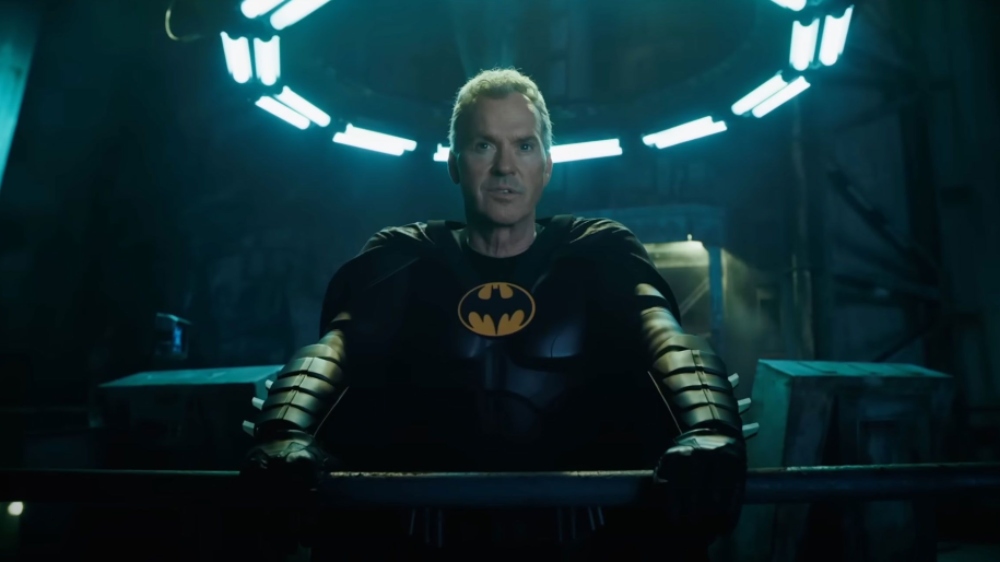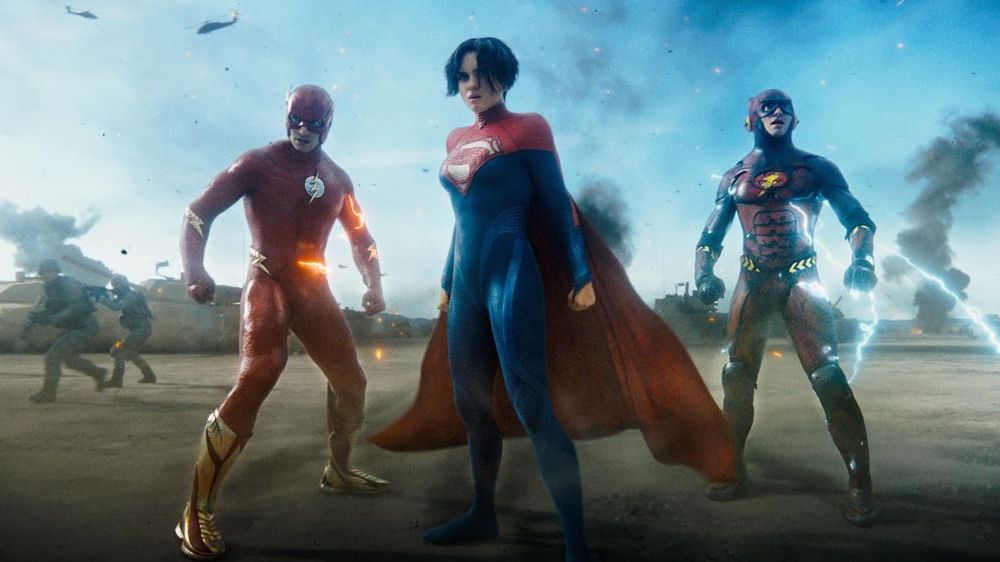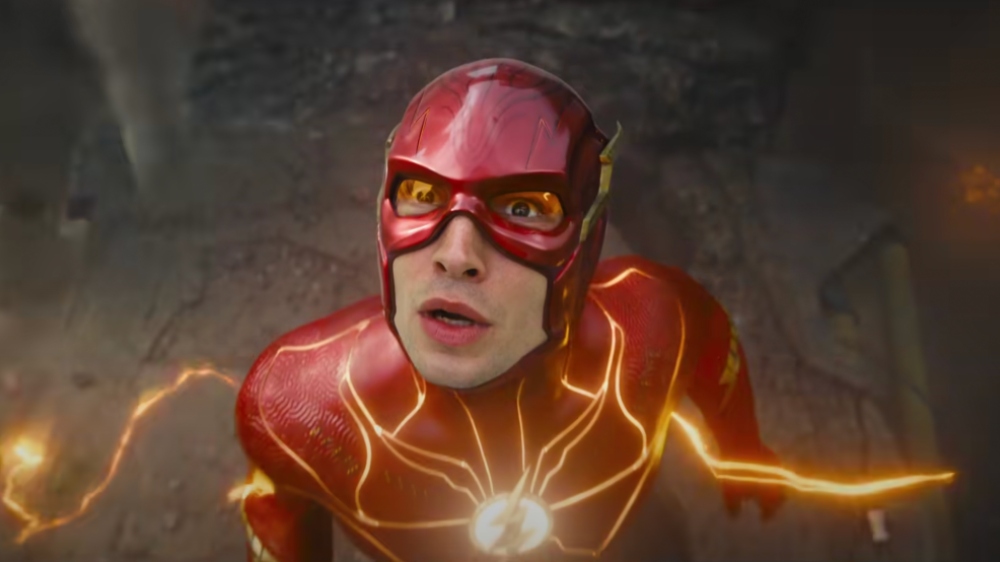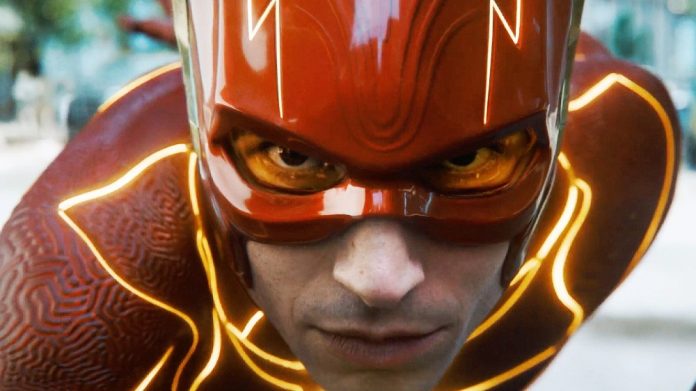“Look at these worlds, colliding and collapsing,” a character laments late in The Flash after breaking the multiverse open for what could be the quintillionth time in recent Hollywood history. If superhero fatigue became inescapable these past few years, exhaustion with today’s multiverse moment can’t be far behind, but at least the costumed crimefighters of the DC Extended Universe are wringing their hands as well.
One of the last films that Warner Bros. made before installing director James Gunn and producer Peter Safran to reset its DC division, this long-in-development superhero picture sends Barry Allen (Ezra Miller) back in time to prevent his mother’s death, a mission that instead ends up trapping the fastest man alive in an alternate reality. There, he (spoiler alert!) meets and mentors another version of himself, one who can’t yet access the Speed Force responsible for Barry’s superhuman speed, and encounters a few other familiar faces from the DC studio archives — sometimes literally.
What this means is that The Flash, as directed by IT‘s Andy Muschietti from a screenplay by Christina Hodson (Birds of Prey), is a doppelganger story as well as a time-travel caper in which Miller, who last appeared in 2017’s Justice League and Zack Snyder‘s director’s cut, pulls double duty. Given the actor’s misconduct allegations and various legal troubles in recent years, it may be a more appealing prospect for some than others to watch Miller — who is non-binary and uses they/them pronouns — acting opposite themselves, particularly given that there’s every chance this will be their last time playing the character.
Still, Miller’s performance in the dual role is one of the few elements of The Flash that actually coheres dramatically. Guilt-ridden and grief-stricken over the unsolved murder of his mother (Maribel Verdú) — for which his father (Ron Livingston) was wrongly imprisoned — this is a more anguished, compelling version of Barry Allen than the non-stop comic relief Miller was saddled with supplying in Justice League, where the actor was left mugging manically at the camera alongside their many other lost-seeming co-stars.

Of course, the Flash is still fleet-footed and faster with a punchline than, say, Ben Affleck‘s Batman, who returns for one last cameo. Muschietti gets plenty of comic mileage out of an early sequence in which Barry sprints into slow-mo action to save a nursery’s worth of newborn babies — plus their nurse and a dog — from plummeting off a hospital complex, which Batfleck’s shenanigans have left crumbling. But once Barry inadvertently sprints his way into the alternate reality, where he’s tasked with training a more immature and hyper-energized version of himself, Miller effectively splits their performance in two, with the prime-universe Barry struggling to let go of his traumatic past and accept his responsibilities as the alternate-universe Barry jokes around incessantly, the lighter half of their dynamic duo. Within a few scenes, you’ll likely forget about all the digital derring-do required to pull off the seamless effect of Barry sharing the screen with himself and instead focus on keeping up with the identical duo’s mile-a-minute banter.
Unfortunately, the rest of The Flash then kicks in, with few such saving graces. After determining that he has arrived in an alternate reality just in time for Man of Steel to take place, with General Zod (Michael Shannon, wasted yet again but at least getting paid) invading Earth with his terraforming World Engine in search of a Kryptonian castaway, Barry learns that certain events — invariably ones we’ve seen play out in previous DC films — are fixed points that connect all infinite universes, meaning they’ll be reiterated over and over, no matter what trifling differences exist between this universe and the next.
Making matters worse, this universe’s Justice League never assembled, meaning that no one is ready to fend off Zod’s assault, and so Barry takes it upon himself to lead the charge in forming his own legion of superheroes. Setting out to track down Batman, the one hero that alternate-universe Barry does seem to have heard of, Barry discovers a retired Bruce Wayne (Michael Keaton) hiding out at dilapidated Wayne Manor, stroking a long gray beard and eating spaghetti that he arranges in parallel strands to deliver all kinds of tiring exposition about retro-causality, branched timelines, and the inevitable intersections between them.

Cajoling Bruce back into the cape and cowl after this multiverse explainer, Barry next leads Batman and his double to seek out Superman, only to discover that this alternate reality brought not Kal-El to Earth but his cousin, Supergirl, aka Kara Zor-El (a bizarrely underused Sasha Calle), who’s more than willing to take the fight directly to Zod. This all leads the heroes toward an underwhelming battle against Zod and his army in the desert that bogs down The Flash‘s third act in too much generic CGI sluice — a structural issue compounded by the film’s egregious visualization of the Speed Force, where Barry keeps sprinting to turn back the clock, as a low-lit cosmic arena where other universes orbit in chintzy digital spheres.
Initially greenlit back in 2014, The Flash is arriving well behind schedule as a result of the DCEU’s constant strategic upheaval even more than the pandemic, but its efforts to once again introduce the multiverse to audiences can’t help but feel out of touch as a result. Ever since the lucrative bait-and-switch of Avengers: Endgame — not the climax to an already-sprawling superhero saga that was advertised but a season-one finale followed by an unending deluge of streaming and theatrical continuations — a sense of growing weariness has crept into superhero cinema, perhaps precipitated by its investment in the idea of a multiverse that enables studios to recycle old characters and storylines ad infinitum.
Marvel’s metastasizing mega-franchise has placed a premium on infinite branching timelines in underwhelming sequels to Spider-Man, Doctor Strange, and Ant-Man, plus seasons of Loki and What If... Meanwhile, Sony’s Spider-Man: Across the Spider-Verse, released a few weeks ago, reiterated its predecessor’s promise of endless realities while delivering half as much movie, all that “limitless storytelling potential” leaving a film about the concept narratively hamstrung. Even outside of superhero cinema, A24’s zany multiverse epic Everything Everything All at Once swept the Oscars this year, winning most of its 11 nominations en route to becoming the most-awarded film of all time; by such point as it was named Best Picture, the film felt less like the little engine that could than a steamroller, proof of the multiverse’s cultural omniscience.

And now The Flash is racing headlong into the multiverse as well. The question of what DC has to gain from investing, like everyone else, in the infinite-worlds concept remains unanswered, especially given that the studio has struggled so mightily to build out just one. The film’s Speed Force, and the visibility it provides into these multiversal dimensions, only offers The Flash opportunities to unload DC Easter eggs that will no doubt delight certain comic-book aficionados in the audience and prove trivial and baffling to the rest of us — or outright offensive, in the instance of ghoulish CGI deep-fakes of figures from the history of the DC film universe that appear as unpleasant visually as they feel conceptually. Reminiscent of the ghastly treatment of Harold Ramis‘ Egon in Ghostbusters: Afterlife, the digital resurrection on display in The Flash feels like a nadir for this sort of cinematic necromancy, in some senses a direct betrayal of the actors involved.
Moreover, the film’s lurching motion toward masturbatory callbacks and fan service all but nullifies its themes about the emotional vacuum that looking back into the past for too long can give rise to. As entertainment, the film represents the middle of the road for DC; it’s technically competent, a little cowardly, and conceptually recycled. There’s fun to be had in seeing Keaton suiting up once again as Batman, though he has not been called back for any assignment worth his time, and a few of the quippy one-liners land just enough to earn a laugh, even if they’re as eminently disposable as the rest of the film.
Engage with The Flash‘s deeper ideas at your own peril, though; for all its infinite worlds, the film has practically nothing to say that it doesn’t then directly contradict regarding the mechanisms of fate, destiny, and self-realization that drive its plot. As busy as the story ends up feeling, and as hyperactive a pair of performances as Miller supplies, there’s no escaping the entire endeavor’s sense of weightlessness. Going back in time and revisiting nearly every previous era of DC in order to tell a story about the importance of letting go, The Flash is just running in place.
The Flash is now playing in theaters worldwide courtesy of Warner Bros.
Grade: C-



